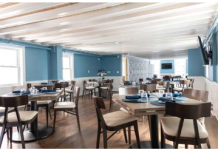By Mary Ann Bourbeau
ATLANTIC HIGHLANDS – Michael McCann’s presentation of aerial photographs, entitled “Thirty Seconds over Totowa,” is like a flight through time.
In it, he documents the changes in the landscape from images taken of a much different New Jersey in the 1920s, 1930s and 1940s.
“In 1930, New Jersey was a garden state,” McCann said. “Much of the state is seen in the early photography as a grayscale checkerboard of farm fields, orchards, small towns and forest. Over time, as I observed it in the 10-year increments in which the aerial photos are available, once-distant villages grew together as the spaces in between were developed.”
McCann will bring his presentation to the Strauss Mansion, 27 Prospect Circle, at 7:30 p.m. Wednesday, May 21, sponsored by the Atlantic Highlands Historical Society. The program is free of charge and refreshments will be served.
“Michael did a railroad program for us last year and he’s such an engaging speaker,” said Kathleen Ligon, a historical society volunteer who books the group’s programs at the Strauss Mansion, a beautiful Queen Anne-style Victorian home built in 1893 as a summer place for Adolph Strauss, a wealthy New York importer. “He’s a wonderful storyteller.”
“Thirty Seconds over Totowa” covers everything from inventions and innovations to lost industries and amusement parks, including the Atlantic Beach Amusement Park in Atlantic Highlands, which closed in 1940.
“These places were wonderful and they’re all gone,” he said. “They’re mostly houses now.”
He talks about different modes of travel, such as the railroads that came directly to the Bayshore, and many more historic tidbits about New Jersey and Monmouth County in particular. McCann shows the old photograph, tells its story and then fades into the current picture. One photo from the 1940s shows the construction of the Thomas Alva Edison Memorial Bridge, which carries Route 9 over the Raritan River; a current picture fades into a bridge with many more lanes. A photo from 1933 shows the Highlands drawbridge under construction, followed by the bridge’s 2012 replacement. A Campbell’s Soup plant in Camden becomes the Camden Riversharks’ minor league ballpark, and a missile base in Holmdel is now a field of tennis courts.
McCann spent his career working as an environmental officer, spending his final two decades of employment at the state Department of Environmental Protection (DEP), making sure that land purchased under the Open Space and Farmland Preservation Act did not contain any hazardous materials.
“I always felt this was really important work,” he said. “I knew I’d never get rich doing it, but the reward was at the end of each day when I went home and knew I did something good that day.”
The funny thing is McCann never examined anything from the air and never took a photograph. He used a microscope to review aerial photos taken in the 1920s through 1940s by different government agencies, which are now part of a library kept by the state in Trenton. For 20 years, McCann pored over these photos while inspecting more than 2,000 sites, some as small as a tenth of an acre and others that were hundreds of acres. If he saw a building on a site in an old photo and the building later disappeared, he would inspect the property to see if there were any underground tanks or other contamination there.
“As a history buff, looking at the aerial photographs was the most fun part of my job,” he said. “Some of the changes are so drastic that you can hear gasps in the audience. I miss that New Jersey. I watched those spaces go away in my lifetime and then again in microscopic detail for my livelihood.”
McCann, who retired from the DEP in 2010, lives in Point Pleasant, Pa. He attempted to sell “Thirty Seconds Over Totowa” as a book, and when that didn’t happen, he still wanted to share it with people. So he offers the program free of charge to area organizations and historical societies.
“I do this as a hobby and it’s so much fun,” he said. “For me, the reward is the applause at the end.”
Vibe writer Mary Ann Bourbeau can be reached at mbourbeau@tworivertimes.com.














